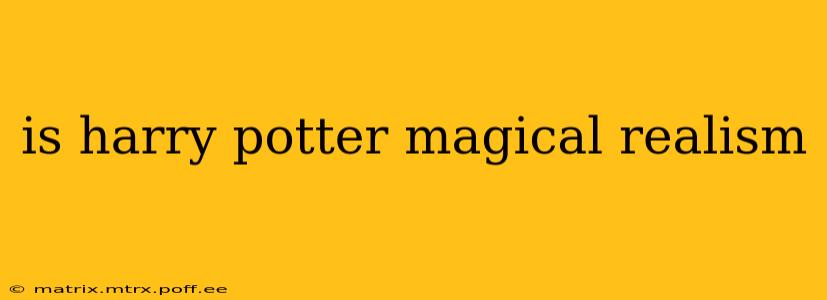The question of whether the Harry Potter series falls squarely into the magical realism genre is a complex one, sparking debates among literary scholars and fans alike. While it undeniably features magical elements, its adherence to the strict definitions of magical realism is debatable. This article will delve into the core tenets of magical realism, examining how the Harry Potter books align with—and diverge from—this captivating literary style.
What is Magical Realism?
Before we can categorize Harry Potter, we need a clear understanding of magical realism. At its heart, magical realism seamlessly integrates fantastical elements into an otherwise ordinary, realistic setting. Crucially, the characters within the narrative generally accept the magic as a normal part of their world, rarely questioning its existence. The magic itself often serves as a lens through which to explore deeper themes of societal structures, cultural beliefs, and human nature. Think Gabriel García Márquez's One Hundred Years of Solitude or Isabel Allende's The House of the Spirits – these are quintessential examples.
How Harry Potter Incorporates Magical Elements
The Harry Potter series undoubtedly employs magic as a central plot device. Spells, potions, magical creatures, and enchanted objects are commonplace in the wizarding world. This creates a fantastic realm distinct from the mundane world of Muggles. However, the wizarding world operates with its own established rules and internal logic, making it a separate, albeit magical, society.
Does Harry Potter's Magic Fit the Bill?
While the magic is central, Harry Potter differs from strict magical realism in several key aspects:
-
The Existence of a Separate Magical World: Unlike magical realism, where magic subtly infiltrates the everyday, Harry Potter features a completely separate wizarding world hidden from Muggles. There’s a clear divide, with magic not impacting the Muggle world in a noticeable way.
-
The Reaction to Magic: Within the wizarding world, magic is not treated as commonplace or inherently unexceptional. There’s a system of rules, laws, and schools dedicated to understanding and controlling magic. Characters often marvel at the power of magic, demonstrating a level of awareness and wonder absent in traditional magical realism.
Is it Fantasy, Then?
The clear demarcation of a magical realm points towards fantasy, not magical realism. Fantasy narratives often create entire worlds governed by their own internal rules and logic, separate from our reality. Harry Potter's intricate world-building, complete with its own history, mythology, and social structures, aligns more closely with the characteristics of high fantasy.
What About the "Realism" Element?
While lacking the core elements of magical realism, the Harry Potter books do incorporate realistic elements. The characters grapple with relatable human experiences: love, loss, friendship, prejudice, and coming-of-age. This grounding in relatable human emotions adds depth and complexity to the fantastical narrative.
So, What Genre is Harry Potter?
Ultimately, Harry Potter transcends simple genre classification. It expertly blends elements of fantasy, adventure, coming-of-age fiction, and even a touch of mystery. While the presence of magic is undeniable, its integration doesn't entirely align with the principles of magical realism. Instead, it functions within a well-defined fantasy framework.
Frequently Asked Questions (Based on People Also Ask)
(Note: Due to the lack of direct "People Also Ask" sections for this specific query across search engines, I have included some common related questions.)
Is Harry Potter a children's book?
While the early books are geared towards younger audiences, the series progressively delves into more complex themes and darker storylines suitable for older teens and adults. The series' broad appeal spans a wide age range.
What are the main themes in Harry Potter?
The Harry Potter books explore numerous significant themes, including love, loss, friendship, good versus evil, prejudice, the importance of courage, and the power of belief. These themes contribute to the series' lasting impact.
How does magic work in Harry Potter?
Magic in Harry Potter operates through spells, potions, and enchanted objects. The effectiveness of magic is often linked to the wand, the incantation, and the intent of the wizard or witch. There are established rules and limitations governing its use.
Are there any similarities between Harry Potter and other magical realism works?
While Harry Potter doesn't strictly adhere to magical realism, the exploration of complex themes within a fantastical context shares some superficial similarities. However, the distinct separation of the magical and mundane worlds sets it apart from typical examples of magical realism.
In conclusion, while Harry Potter utilizes magic extensively, its narrative structure and world-building place it firmly within the realm of fantasy literature rather than magical realism. The blend of fantastical elements with realistic human experiences, however, gives it a unique and enduring appeal.
